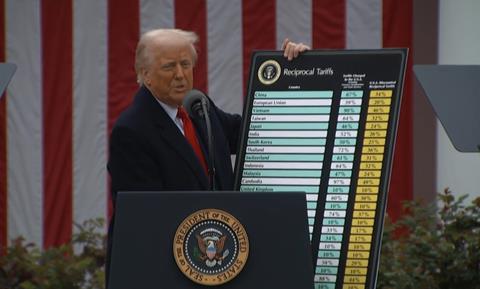But construction prices could also ease as overseas exporters dump products in the UK to avoid US barriers

UK construction experts have given a mixed reaction to Donald Trump’s “liberation day” tariffs, with some warning investors might pause funding for big schemes and others suggesting it could lead to lower material prices.
The US president announced a raft of worldwide tariffs on Wednesday, including a baseline 10% tax on all imports into the country which will come into effect tomorrow (Saturday) in what economists have described as a watershed moment in global trade.
The UK is the least affected developed country with only the baseline tariff imposed on it, although other countries are facing much more severe reciprocal rates including China, at 54%, Japan at 24% and the EU at 20%.
While the UK’s lower rate means it could become an attractive location for overseas businesses to import into the US, industry experts warn short and medium-term uncertainty could stall many investment decisions including on major projects.
Arcadis head of strategic research and insight Simion Rawlinson described the tariffs as “clearly not positive” for overall UK growth.
“There will be direct impacts on inward investment and domestic investment decisions, particularly associated with manufacturing, as any investment that has a component of production serving the US will be under review,” Rawlinson said.
“My anticipation is that investment decisions will be put on hold and that big binary decisions on where to locate investment won’t take place until there is greater clarity on the longevity of the measures put in place.”
Noble Francis, economics director at the Construction Products Association, said short term uncertainty associated with reciprocal tariffs could impact global economic growth prospects and investor confidence.
“The rise in uncertainty means increased risk, which must be factored into the pricing of firms worldwide, leading to further inflation, and this is already bad news,” he said.
Francis also warned construction products imported from overseas could be subject to higher price volatility as exporters reassess established trade routes.
While around three quarters, 76%, of UK construction products are sourced locally, the cost of materials which are commonly imported including electrical wires and sawn timber “may be an issue for firms on fixed-price contracts signed up to 12-24 months ago when these potential risks wouldn’t have been on most firm’s lists of key risks”, Francis said.
However, Francis also suggested prices for some products could decrease if countries which previously exported to the US move to export more to the EU and the UK to avoid high tariffs.
Rawlinson added: “There will be a lot of products from tariff hit countries including China and Canada looking for new markets, so expect some product and price dumping. The EU is already taking steps to erect barriers against low-cost aluminium. This might be more difficult for the UK.”
Meanwhile, HTA Design chair Ben Derbyshire warned the immediate effect of the tariffs could be further supply chain scarcity and cost inflation, adding: “Both are immensely counter-productive to the government’s efforts to ramp up housing delivery.
“MHCLG are doing their best to build a sensible response to the crisis of supply and affordability in housing and a trade war must not be allowed to trash their efforts,” he said.
“Just as Starmer is working on considered responses to Washington’s new imperialism, I hope the rest of the world can find a way of reducing the disruption to the global supply chain on which the success of the industry depends.”
And while Kelly Boorman, national head of construction at tax consultant RSM UK, said the tariffs may not hit construction as acutely as other sectors, the “ripple effect will be felt across all businesses”.
She said: “It creates more uncertainty and could hit growth, so businesses need to plan ahead by considering diversification of material suppliers, reviewing procurement processes, investing in technology and focusing on working capital management to mitigate any potential risks.”
















No comments yet